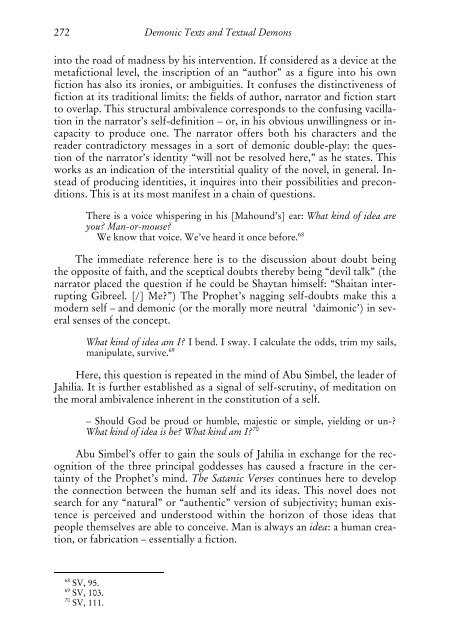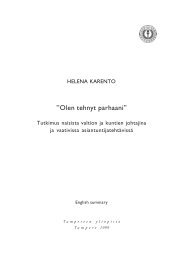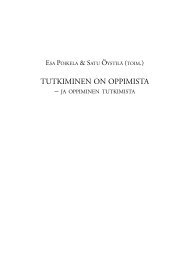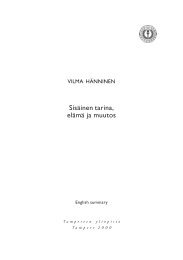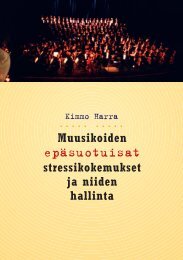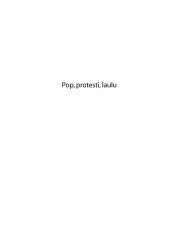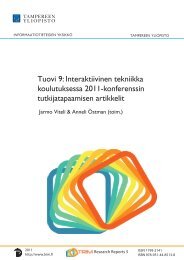Note on this edition: this is an electronic version of the 1999 book ...
Note on this edition: this is an electronic version of the 1999 book ...
Note on this edition: this is an electronic version of the 1999 book ...
Create successful ePaper yourself
Turn your PDF publications into a flip-book with our unique Google optimized e-Paper software.
272Dem<strong>on</strong>ic Texts <strong>an</strong>d Textual Dem<strong>on</strong>sinto <strong>the</strong> road <strong>of</strong> madness by h<strong>is</strong> interventi<strong>on</strong>. If c<strong>on</strong>sidered as a device at <strong>the</strong>metaficti<strong>on</strong>al level, <strong>the</strong> inscripti<strong>on</strong> <strong>of</strong> <strong>an</strong> “author” as a figure into h<strong>is</strong> ownficti<strong>on</strong> has also its ir<strong>on</strong>ies, or ambiguities. It c<strong>on</strong>fuses <strong>the</strong> d<strong>is</strong>tinctiveness <strong>of</strong>ficti<strong>on</strong> at its traditi<strong>on</strong>al limits: <strong>the</strong> fields <strong>of</strong> author, narrator <strong>an</strong>d ficti<strong>on</strong> startto overlap. Th<strong>is</strong> structural ambivalence corresp<strong>on</strong>ds to <strong>the</strong> c<strong>on</strong>fusing vacillati<strong>on</strong>in <strong>the</strong> narrator’s self-definiti<strong>on</strong> – or, in h<strong>is</strong> obvious unwillingness or incapacityto produce <strong>on</strong>e. The narrator <strong>of</strong>fers both h<strong>is</strong> characters <strong>an</strong>d <strong>the</strong>reader c<strong>on</strong>tradictory messages in a sort <strong>of</strong> dem<strong>on</strong>ic double-play: <strong>the</strong> questi<strong>on</strong><strong>of</strong> <strong>the</strong> narrator’s identity “will not be resolved here,” as he states. Th<strong>is</strong>works as <strong>an</strong> indicati<strong>on</strong> <strong>of</strong> <strong>the</strong> interstitial quality <strong>of</strong> <strong>the</strong> novel, in general. Instead<strong>of</strong> producing identities, it inquires into <strong>the</strong>ir possibilities <strong>an</strong>d prec<strong>on</strong>diti<strong>on</strong>s.Th<strong>is</strong> <strong>is</strong> at its most m<strong>an</strong>ifest in a chain <strong>of</strong> questi<strong>on</strong>s.There <strong>is</strong> a voice wh<strong>is</strong>pering in h<strong>is</strong> [Mahound’s] ear: What kind <strong>of</strong> idea areyou? M<strong>an</strong>-or-mouse?We know that voice. We’ve heard it <strong>on</strong>ce before. 68The immediate reference here <strong>is</strong> to <strong>the</strong> d<strong>is</strong>cussi<strong>on</strong> about doubt being<strong>the</strong> opposite <strong>of</strong> faith, <strong>an</strong>d <strong>the</strong> sceptical doubts <strong>the</strong>reby being “devil talk” (<strong>the</strong>narrator placed <strong>the</strong> questi<strong>on</strong> if he could be Shayt<strong>an</strong> himself: “Shait<strong>an</strong> interruptingGibreel. [/] Me?”) The Prophet’s nagging self-doubts make <strong>th<strong>is</strong></strong> amodern self – <strong>an</strong>d dem<strong>on</strong>ic (or <strong>the</strong> morally more neutral ‘daim<strong>on</strong>ic’) in severalsenses <strong>of</strong> <strong>the</strong> c<strong>on</strong>cept.What kind <strong>of</strong> idea am I? I bend. I sway. I calculate <strong>the</strong> odds, trim my sails,m<strong>an</strong>ipulate, survive. 69Here, <strong>th<strong>is</strong></strong> questi<strong>on</strong> <strong>is</strong> repeated in <strong>the</strong> mind <strong>of</strong> Abu Simbel, <strong>the</strong> leader <strong>of</strong>Jahilia. It <strong>is</strong> fur<strong>the</strong>r establ<strong>is</strong>hed as a signal <strong>of</strong> self-scrutiny, <strong>of</strong> meditati<strong>on</strong> <strong>on</strong><strong>the</strong> moral ambivalence inherent in <strong>the</strong> c<strong>on</strong>stituti<strong>on</strong> <strong>of</strong> a self.– Should God be proud or humble, majestic or simple, yielding or un-?What kind <strong>of</strong> idea <strong>is</strong> he? What kind am I? 70Abu Simbel’s <strong>of</strong>fer to gain <strong>the</strong> souls <strong>of</strong> Jahilia in exch<strong>an</strong>ge for <strong>the</strong> recogniti<strong>on</strong><strong>of</strong> <strong>the</strong> three principal goddesses has caused a fracture in <strong>the</strong> certainty<strong>of</strong> <strong>the</strong> Prophet’s mind. The Sat<strong>an</strong>ic Verses c<strong>on</strong>tinues here to develop<strong>the</strong> c<strong>on</strong>necti<strong>on</strong> between <strong>the</strong> hum<strong>an</strong> self <strong>an</strong>d its ideas. Th<strong>is</strong> novel does notsearch for <strong>an</strong>y “natural” or “au<strong>the</strong>ntic” versi<strong>on</strong> <strong>of</strong> subjectivity; hum<strong>an</strong> ex<strong>is</strong>tence<strong>is</strong> perceived <strong>an</strong>d understood within <strong>the</strong> horiz<strong>on</strong> <strong>of</strong> those ideas thatpeople <strong>the</strong>mselves are able to c<strong>on</strong>ceive. M<strong>an</strong> <strong>is</strong> always <strong>an</strong> idea: a hum<strong>an</strong> creati<strong>on</strong>,or fabricati<strong>on</strong> – essentially a ficti<strong>on</strong>.68SV, 95.69 SV, 103.70SV, 111.


